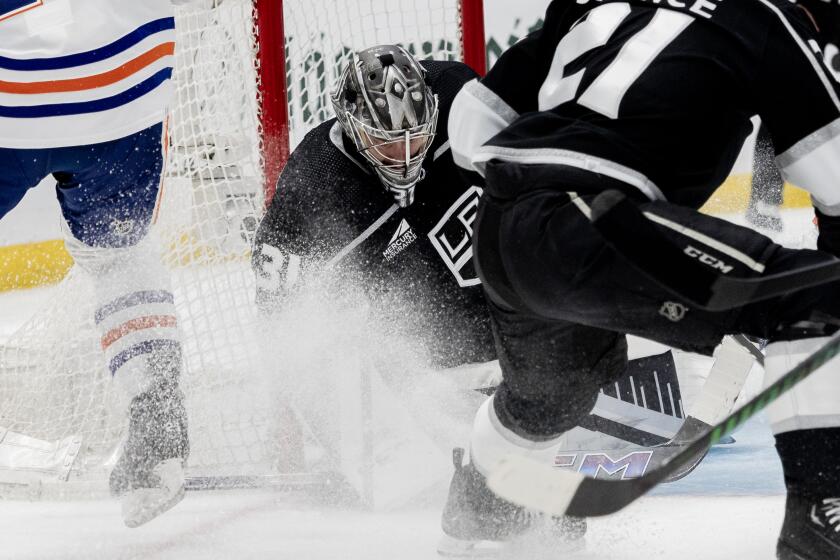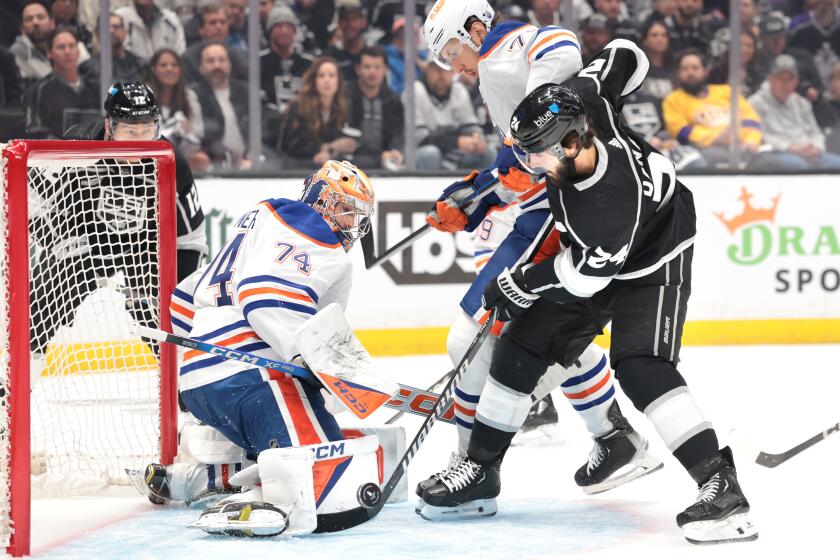Ducks to Lose Their Might
Mighty no more.
In a move that loosens the team’s identity with Disney, the Mighty Ducks of Anaheim will become the Anaheim Ducks next season, owner Henry Samueli said Thursday.
The team considered other names, including the Anaheim Condors and the Anaheim Bears. The team is expected to adopt a new logo, colors and uniform, but Samueli said no decision is expected until the end of the season.
“They’re looking at literally 100 different options,” said David Paine, whose public relations firm assisted the Ducks in their market research.
Samueli and his wife, Susan, bought the team from Disney last year and pledged to consider a new name and include fans in the process. In surveys that included a telephone poll of season-ticket holders, Paine said “nearly two-thirds” preferred a new name.
Still, Paine said, fans expressed some sentiment for honoring the history of the team. The Ducks’ run to the Stanley Cup finals in 2003 contributed to the decision not to trash the nickname entirely.
“In selecting the name the Anaheim Ducks, we are respecting the heritage of a tremendous organization that has been a very important and visible part of the community, not to mention Western Conference champions and a Stanley Cup finalist,” Samueli said in a statement.
Said winger Teemu Selanne: “It’s really good that the new owners are going to keep the same Ducks name. People know the Ducks are from Anaheim. The Ducks were part of the original name. Maybe the ‘Mighty’ was more about the Disney side of it.
“Anaheim Ducks feels great.”
Guy Hebert, the team’s original goaltender, said the franchise has been “rejuvenated” under the Samuelis and said the new name “makes the team a little more theirs.”
Hebert said the old name was “cartoonish” but made sense for Disney and did not bother the inaugural squad.
“And guys like [enforcers] Stu Grimson and Todd Ewing would beat some sense into people who laughed,” Hebert said.
Disney chairman Michael Eisner personally christened the expansion team in 1993, after the Disney children’s movie of the same name. The name horrified hockey purists -- the Ducks’ first coach, Ron Wilson, said his initial reaction was, “How can they do this in the National Hockey League?” -- but delighted youngsters across the United States and Canada and generated windfall merchandise sales.
After a honeymoon that included 51 consecutive sellouts, and aside from the improbable Stanley Cup run, the Disney legacy deteriorated into one of lousy teams, a half-empty Arrowhead Pond and the unceremonious departure of popular figures, including Wilson and star players Selanne and Paul Kariya.
In a season in which Disney bowed out and Selanne returned, the name change indicated the Samuelis’ decision to ease the franchise into a new identity, said Paul Swangard of the Warsaw Sports Marketing Center at the University of Oregon.
“Faced with a clean break or a clean embrace, they took the middle ground,” Swangard said. “I think this will require more than a name change. The things that will follow will help create a new identity.”
As an example, Swangard pointed to his school. The university’s athletic teams, known as the Ducks, featured a Donald Duck mascot, used with Disney’s permission. In recent years, he said, the school has used a stylized “O” as its primary logo.
“You don’t walk around Oregon today and see any sign of Donald,” he said. “It’s nostalgia, but it’s not front and center.”
Eisner loved the Mighty Duck name, with its reference to the movie and with the non-traditional nickname first, followed by “of Anaheim.” He was not dissuaded by the objections of several other top Disney executives, as revealed in testimony in the trial between Anaheim and the Angels.
Tony Tavares, the former Disney sports chief, said he considered Eisner’s flirtation with calling the baseball team the Mighty Angels of Anaheim “the second-stupidest idea I’ve ever heard in the history of sports,” with the Mighty Duck name at No. 1.
Sandy Litvack, Disney’s corporate counsel and Eisner’s chief lieutenant, said he cringed at the name too.
“I thought it was absolutely silly,” Litvack said, “but it was my boss’ name, so I really liked it.”
*
Times staff writer Eric Stephens contributed to this report.
More to Read
Go beyond the scoreboard
Get the latest on L.A.'s teams in the daily Sports Report newsletter.
You may occasionally receive promotional content from the Los Angeles Times.






